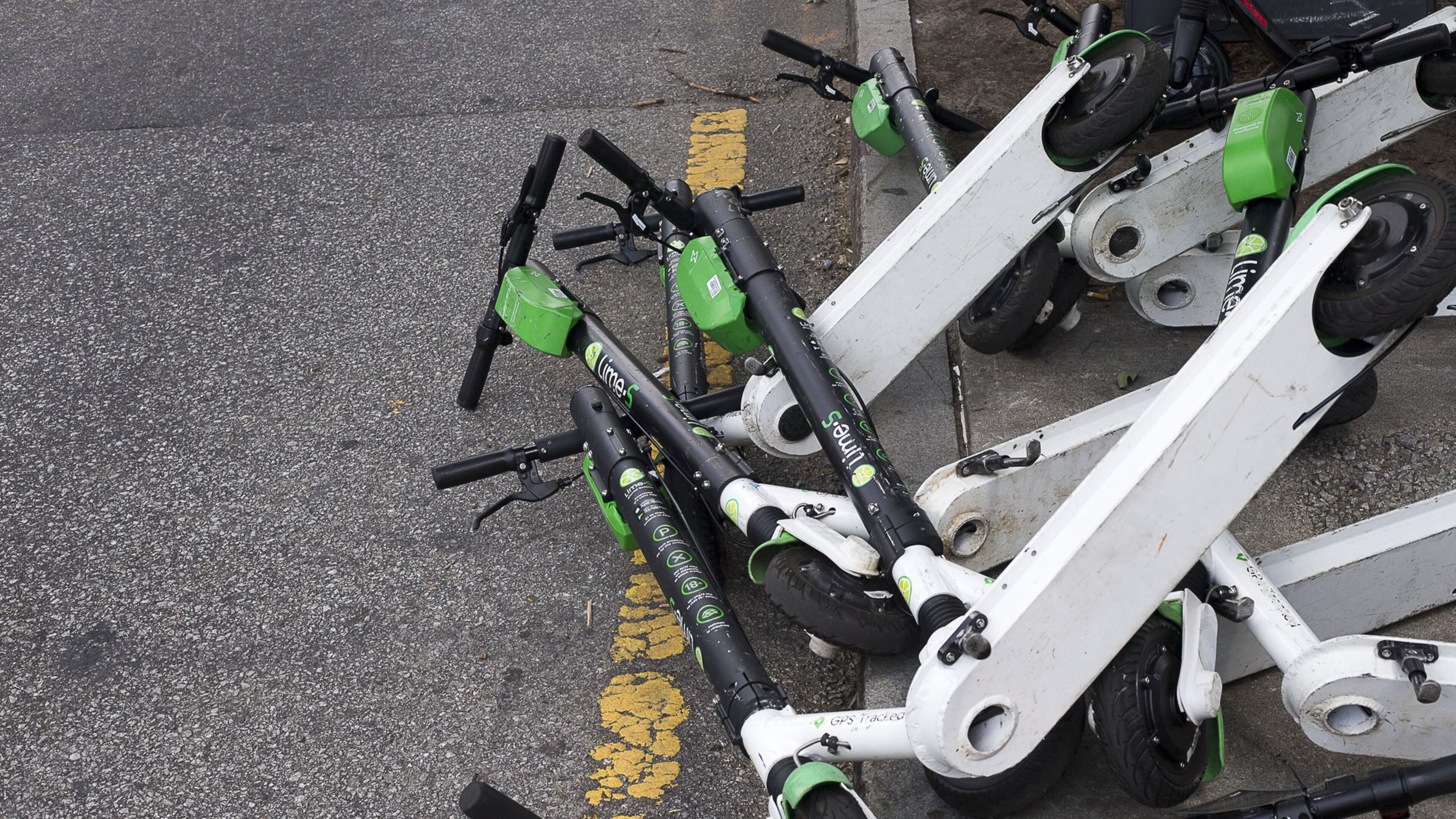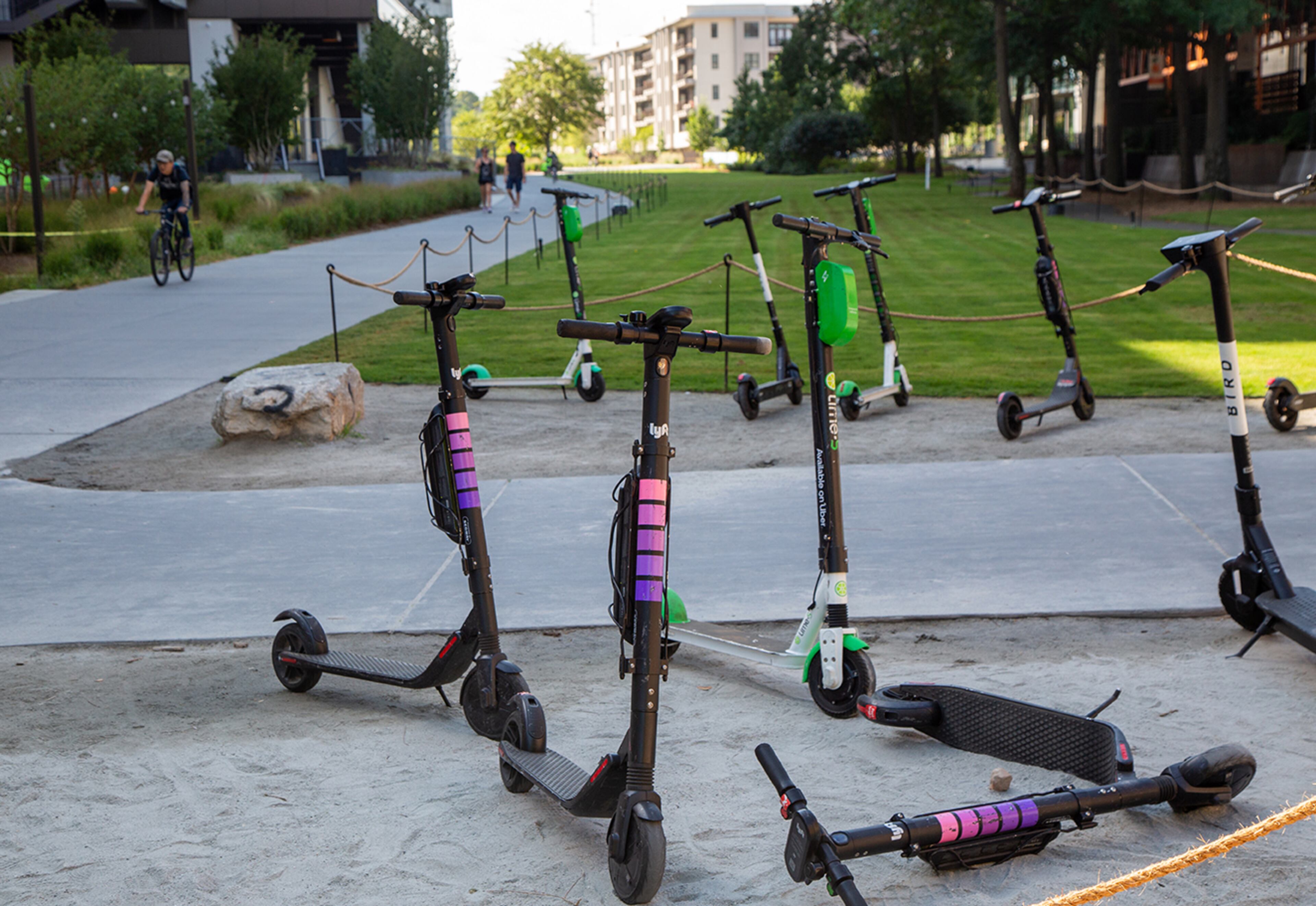E-scooters bring together some of Atlanta’s most influential leaders

On the 53rd floor of a downtown skyscraper, some of the most influential people in Atlanta gathered Wednesday to discuss a controversial issue happening on the street.
How should cities deal with new transportation devices like electronic scooters?
A discussion of that question by a panel of experts on Wednesday drew Atlanta City Council President Felicia Moore, former Atlanta councilwoman and two-time mayoral candidate Mary Norwood, former DeKalb County CEO Burrell Ellis and former attorney general Sam Olens.
READ | Which metro Atlanta cities have banned e-scooters?
The panel included leaders from State Road and Tollway Authority, Georgia Tech, consultant group Deloitte, scooter provider Uber and Atlanta councilman Amir Farokhi. The event was hosted by the Dentons law firm and was moderated by former Atlanta council president Ceasar Mitchell, who is a partner with the firm.
“The regulatory environment is trying to catch up,” to the technology, Mitchell said.
The discussion focused on the concept of building smart cities that work for everyone, how to regulate and fund them, and the challenges of doing so.
The panel touched on topics as high-minded as how to build cities that don’t favor one mode of transportation over others, to the nitty-gritty of why federal funding for infrastructure has been sharply cut in recent years.
IN METRO NEWS | By neighborhood: How long on average a person lives in metro Atlanta
Chris Tomlinson, head of Georgia Regional Transportation Authority, said the future could be people using multiple transportation devices on a single trip. But not every person will be comfortable with every mode of transportation, he said.
The average bus rider is a 54-year-old female, Tomlinson said. “That’s not normally who I see on a scooter every day.”
Seemingly overnight about 18 months ago, Midtown sidewalks were flooded with scooters from industry leaders Bird and Lime, forcing Atlanta politicians to create new regulations.
Municipal staff all over metro Atlanta say scooter companies invaded cities without the blessing of elected officials, getting residents attached to their service before officials could draw up regulations to guard against clutter and protect safety.
The state Legislature parked a pair of bills that would have regulated e-scooters statewide, leaving local legislators to figure it out on their own.

Atlanta Councilman Farokhi rode to Wednesday’s event on a scooter, and said he expects the city to reduce the number of permitted scooter companies to no more than four or five who have shown they can play by the rules. He said that will likely happen during the first quarter of next year as permits expire.
Atlanta Mayor Keisha Lance Bottoms placed a ban on the use of sharable e-scooters and e-bikes from 9 p.m. to 4 a.m. in August, days after a fourth scooter rider had been killed in metro Atlanta. Bottoms also recently announced a plan to improve safety of city streets, which includes adding eight new miles of protected lanes for bikes and scooters.
Uber’s regional spokesman Nick Juliano said policymakers come under pressure “to react when there are tragedies.”
READ | One day in Atlanta through the eyes of 50 scooter riders
Farokhi said that from January to August, about 40% of his emails were about scooters, mostly from people who were frustrated. He said nearly three-quarters of the 500,000 to 600,000 scooter rides in Atlanta every month happen in his ward, which includes Midtown.
Farokhi said he didn’t agree with the nighttime ban because “the scooter wasn’t the culprit.”
Panelist Debra Lam, managing director of Smart Cities and Inclusive Innovation at Georgia Tech, said scooters have a perception issue.
“When anything new comes up that endangers that car culture, our automatic assumption is to target the other,” Lam said.
READ | North Fulton prepares for e-scooters, but do they need to?
Lam said e-scooters are still seen as a mode of transport for those with means, and cities need to think about that when building infrastructure.
Atlanta City Planning Commissioner Tim Keane agreed.
“This way of getting around isn’t a frivolous thing, it’s not about recreation,” Keane said. “It’s about how people live ... it’s about how people who have no other options get around the city.”
Keane said congestion is only getting worse with all the people expected to move to the city, and hard choices will have to be made.
“Often it will mean taking space from cars because that is how we must grow,” he said.
Follow The Atlanta Journal-Constitution on Facebook and Twitter


